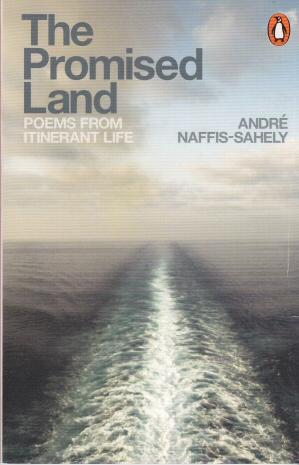The Promised Land: Poems from Itinerant Life
André Naffis-Sahely
(Penguin, 2017); pbk, £7.99.
It is quite often said a good book can take the reader on a journey; in this collection the journey is quite literal as we are invited to flit around the globe from Abu Dhabi to Venice, from Tamil Nadu to the Catskills. Don’t be mistaken – this is not a book simply about travelling but about perspective… the type of perspective that is born out of an itinerant life.
‘Disposable Cities’ is the perfect beginning to the journey and gives the reader an indication of the mental voyage they are about to embark upon. It speaks about the cities we build and leave to ruin, once we’ve taken what we want from the earth.
Once bled dry, these cities’ roads go raw with potholes, chickens roam loose
in opera houses, power lines sag, and rot seeps in, tarring all in sight.
Despite the poignant reflection of such places André Naffis-Sahely doesn’t neglect the elements of cultural geography, how the traditions and mentalities of people weave themselves into the fabric of the physical environment they inhabit:
El Dorados are a state of mind, places where people come to reinvent themselves
And realize their most eccentric fantasies.
The collection is also peppered with Naffis-Sahely’s sharp observations, such as the ‘Jumeriah Janes’ complaining about their comfort or the stark statement in ‘Vanishing Act’ (‘Only two out of ten people die in Abu Dhabi’) emphasizing the exclusivity and transient nature of the place.
As we delve deeper into The Promised Land there are some poignant poems dedicated to the poet’s father, mother and brother. In ‘Wanted Man’ he writes of his father’s incarceration,
you’d discovered
how men could be made to fit together like jigsaw pieces
when forty share a room designed for eight.
There is a bluntness to some of Naffis-Sahely’s words which can provide a punch John Henry Lewis would be proud of, while maintaining a sense throughout that this collection is written by a man who truly cares, and Naffis-Sahely does seem to deeply care about the world and the people who inhabit its space.
The titular piece, ‘The Promised Land’, deals with hope and despair in equal parts as he so masterfully does throughout the book. This is followed by one of the most understated poems of the collection, ‘A Kind of Love’, which is subtle in its melancholy, yet sits as an honest reflection of a failed relationship and retains a sense of humour.
We continue our journey and swing from London, Kolkata to Fez and on to North America. In ‘Through the Rockies’ we step aboard the Zephyr and are introduced to some of the characters on the train, in particular the tale of Tanika, a woman on the run who has six children in Indiana:
Everyone here has one foot in life
and the other in the future, or the past –
usually in the past.
There is a subtle profundity like this throughout, a knack for drawing out nuances from the complexities of life. The missed connections of ‘Brief Encounters of the Hopeless Kind’ has a romanticism to it and a longing to have heeded the train’s instruction to ‘SEE SOMETHING, SAY SOMETHING’, which is an example of Naffis-Sahely’s astute play with the meaning of train announcement.
Where else to further consider civilisation than taking a trip back across the land to the streets of Ancient Rome? ‘The Crisis of the Third Century’ considers the fall of the Western Roman Empire,
They were dying, the Romans and they knew it:
fewer sandals took to their roads, and wars
were getting pricier, bloodier; less satisfying, too.
This wonderful collection from André Naffis-Sahely isn’t only an enthralling read of wonderful phrasing and imagery but an important one. It speaks thoughtfully of the land we inhabit, whether it be East or West, old or new. This is a book which encourages one to actively consider the world we inhabit and our role in the changing times.
Steven Chamberlain


Leave a Reply